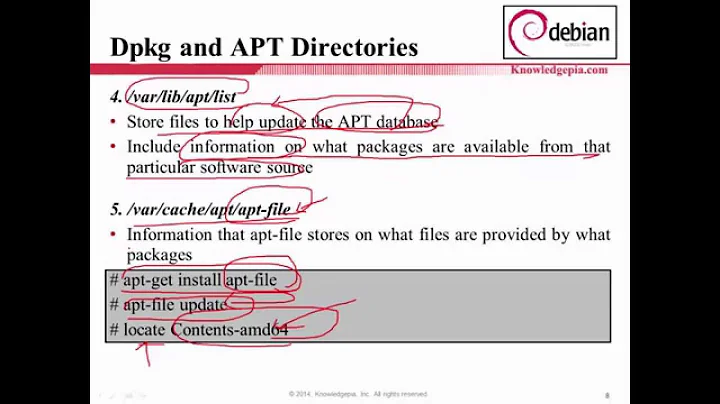Find what package a file belongs to in Ubuntu/Debian?
Solution 1
apt-file search filename
or
apt-file search /path/to/file
To install apt-file, use:
sudo apt-get install apt-file
You will need to update its database before you can use it:
sudo apt-file update
Solution 2
(Debian/Ubuntu) Discover what package a file belongs to:
dpkg -S /usr/bin/ls
'dpkg -S' just matches the string you supply it, so just using 'ls' as an argument matches any file from any package that has 'ls' anywhere in the filename. So usually it's a good idea to use an absolute path. You can see in the second example that 12 thousand files that are known to dpkg match the bare string 'ls'.
Solution 3
packages.debian.org is what I always use to accomplish this task. It is superior over apt-file because it can find parts of filenames as well. It's also linked up to the main packages list which will list descriptions, bugs, etc. All in all a good website. Not as useful from the command line, but still quite useful.
For speed, I bookmarked the url:
http://packages.debian.org/search?searchon=contents&keywords=%s&mode=filename&suite=unstable&arch=any
in Firefox, and added "debfind" as a keyword (click "more" in the bookmark manager with it hilighted), so I can just type "debfind " and it will work. You can change 'suite' it from unstable to stable or testing if you like, for other versions of the distribution.
Solution 4
You can also use dlocate. From the man page;
$ dlocate [ PATTERN ]
List all records where either the package name or the filename matches PATTERN.
Solution 5
I found Wajig...
wajig whichpackage /path/to/file
eg.
wajig whichpackage /etc/apt/sources.list
Wajig is a handy command line or console tool which wraps all the apt-get, dpkg goodness that you never wanted to learn. .
To install wajig use:
apt-get install wajig
That command 'whichpackage' itself depends on apt-file
you will still need to update its database before you can use it: - I don't know yet if wajig update whixh does an apt-get update also updates the file cache, but I expect it may.
sudo wajig update
sudo apt-file update
( and Super Cow, Easter egss ? ! )
Related videos on Youtube
Mo .
I'm a grad student in computer science at UCSD. My research is in compilers and programming languages, and I am also intersted in kernel development and real-time 3D graphics.
Updated on September 17, 2022Comments
-
Mo . over 1 year
I frequently find myself missing a program, man page, or other file when working on my Ubuntu 8.04 system. Is there any simple way to look up what package contains a given file (whether it is installed already or not)? Maybe some obscure option for apt or dpkg?
-
 Admin almost 9 yearsSame on Ubuntu: askubuntu.com/questions/481/…
Admin almost 9 yearsSame on Ubuntu: askubuntu.com/questions/481/… -
 Admin over 7 years
Admin over 7 yearsdpkg -S /path/to/fileif you have the package installed. -
 Admin over 3 years^ Accepted answer, better than depending on
Admin over 3 years^ Accepted answer, better than depending onapt-file
-
-
John T almost 15 yearsThat is only if the files already installed
-
Avio over 10 years
dlocateis also my favorite method, very reliable. -
tanius about 9 yearsIn contrast to
apt-file, this also finds the package to a file if it was installed manually viadpkg -i! -
 user about 9 yearsThis does not work for arbitrary files however, like the OP requested.
user about 9 yearsThis does not work for arbitrary files however, like the OP requested. -
Jokester about 9 yearsFYI: apt-file seems to depend on Contents-amd64.gz provided by repositories. And not all 3rd party repos provide this file.
-
 Renan Souza almost 9 yearsNow if only Raspbian also had one :)
Renan Souza almost 9 yearsNow if only Raspbian also had one :) -
jarno over 8 years@Avio
dlocatedoes not find a recently installed package unless you runsudo update-dlocatedbfirst. The command is automatically run daily in /etc/cron.daily/dlocate -
DrBeco about 8 yearsThis is a problematic tip if the program does harmful things and IS installed. Adding
-hor--helpat the end would help a bit. If adding-hat the end would make this safe enough I would recommend, but even so it is not a good way to achieve what the OP asks. -
Northys over 7 yearsIt did not work for me. I updated the database but it does not return anything.
dpkg -Sworks as described below. -
Pablo A almost 7 yearsIf you get dpkg-query: no path found matching pattern try this:
dpkg -S "$(readlink -fn "$(which rename)")". -
 tripleee about 6 yearsDownvote: The link is broken and the link seems to be for RPM packages in the first place.
tripleee about 6 yearsDownvote: The link is broken and the link seems to be for RPM packages in the first place. -
SCH almost 6 yearsWeird, this didn't work for me:
dpkg-query: no path found matching pattern /usr/bin/java, though there is a file at/usr/bin/java -
Ctrl-C almost 6 yearsIt doesn't work with custom repos though.
-
Alexander Shcheblikin almost 6 yearsPoor choice in regards to automation.
-
 vog over 4 years@nnyby See comment of Pablo A
vog over 4 years@nnyby See comment of Pablo A -
T-Shamspour over 4 yearsIn most cases you will not need to install a non-standard package (apt-file) and get away with using the pre-installed one (dpkg). See top voted answer.
-
 71GA over 4 years@Vog That solution doesn't work in my case.
71GA over 4 years@Vog That solution doesn't work in my case. -
 vog over 4 years@nnyby Which OS and version are you using? On Debian 10 (buster) the command
vog over 4 years@nnyby Which OS and version are you using? On Debian 10 (buster) the commanddpkg -S "$(readlink -fn "$(which java)")"returnsopenjdk-11-jre-headless:amd64: /usr/lib/jvm/java-11-openjdk-amd64/bin/java




